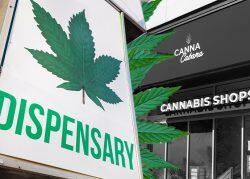Shlomi Bagdadi had to figure out what to do about all the pot.
The founder of Tri State Commercial Realty was inundated with calls this summer from smoke shop operators looking to lease retail space in the buildings he represents.
Smoke shops are a classic genre of the New York corner store, shoebox spaces where you can buy a soda, a bag of chips and a bong all in one place.
But in just a few months, they’ve become some of retail’s biggest space takers after adding a lucrative new item to the menu: cannabis.
While the state sputters toward opening its first legal dispensaries, smoke shops have become some of the most popular — if illegal — tenants in town.
Bagdadi called an executive meeting to figure out how to handle the new demand, because while customers clearly value a convenient place to buy cannabis, landlords aren’t so enthused. Some worry about unpleasant odor or customers; others fear legal issues.
It has become an open secret in New York that smoke shops often sell cannabis under the table. The sales represent an all-cash revenue stream with millions of potential customers; a third of city residents reported using cannabis in a city survey.
Lease requests are pouring in, not only from experienced operators and stores looking to expand, but also first-timers who sense a money-making opportunity.
But as the state’s regulations continue to change, even lawyers are not certain whether landlords are safe in renting to bona fide dispensaries, let alone the clearly illegal ones.
“There’s a lot of gray area right now,” said Michael Robotti, an attorney for Ballard Spahr and part of the team that prosecuted Mexican druglord Joaquín “El Chapo” Guzmán Loera.
But to many commercial landlords and retailers, that’s a risk worth taking. Hungry for deals after the Covid downturn, cannabis has New Yorkers seeing green in more ways than one.
Lease now, ask later
Smoke shops operate in a gray market. While selling cannabis without a license is illegal, enforcement of that particular rule all but stopped when the state legalized cannabis for recreational use last March.
Yet cannabis is still illegal at the federal level, making it difficult for operators to get traditional bank financing.
Meanwhile, New York’s dispensary rollout, and indeed its entire legalization process, has been sluggish from the start. Dispensaries cannot operate without a product to sell, so establishing regulations and licensing for cannabis cultivators and wholesalers came first. Each step has been slow, with lengthy weigh-in periods from the public and the state’s Office of Cannabis Management.
As customers wait for dispensaries to open, smoke shops are filling the demand.
It’s hard to know just how many smoke shops there are. They’re a distinct subspecies of the New York corner store — a close relative of bodegas, delis, convenience stores, newsstands, gas stations, groceries and grills. But state and city registration forms don’t include a checkbox for the type of store that sells gas mask bongs.
Take the state’s active tobacco retailers map: While it includes smoke shops, it also counts delis, groceries, convenience stores and hundreds of shapeshifting “stands” and “others.”
Some 5,476 shops are licensed to sell tobacco in the five boroughs, according to state data. That number falls to around 1,700 after filtering out delis and supermarkets. While pinpointing the exact definition is hard, as a Supreme Court justice once said of pornography, you know it when you see it.
As New York rolls out its cannabis dispensary program, unlicensed sellers have turned neighborhood smoke shops into 24-hour dispensaries. Their musk is so strong that even Mayor Eric Adams has taken note.
Read more



“The No. 1 thing I smell right now is pot,” Adams said at a recent press conference, discussing an uptick in 311 complaints about the odor.
The trend began in the early days of the pandemic, according to David Abrams, founder of commercial broker masonre. With desk workers staying home, two types of businesses were still looking to lease: Quick-service restaurants and smoke shops.
“They were calling on everything,” Abrams said. While institutional landlords sat and waited for rents to come back to normal, fast dining and smoke shops snatched up the smaller types of storefronts that rent for $10,000 to $20,000 per month.
The cannabis gray market started small, but two years on, the steady cash has some thinking bigger. Bagdadi says he recently got a call from a smoke shop operator asking to lease one of his clients’ retail spaces near Madison Square Garden. The storefront typically rents for almost $1 million a year.
“How are they going to afford that?” Bagdadi thought. “Like, what are they selling? Jewelry, diamonds?”
The smoke shops that sell cannabis are capitalizing on the state’s slow rollout of its dispensary program: Bureaucrats are sifting through applications for dispensary licenses and no storefronts for legal shops have been leased, so illegal ones are filling the void.
“Bottom line, it’s ‘Get the real estate, and hope in the next little bit it will be legal,’” Abrams said.
Liability in question
It remains unclear what liability landlords face for renting to smoke shops that illegally sell cannabis.
“This is just another thing that owners have to be cognizant of when they’re entering into leases,” said Alexander Lycoyannis, an attorney at Rosenberg & Estis who has written about leasing to cannabis retailers. “If the lessee is selling, the lessee is liable, and the building owner is also liable.”
The city has largely declined to go after illegal cannabis sellers. The lax enforcement could end once the legal shops are up and running, which could render shop owners and their landlords vulnerable.
Last week, a pair of lawmakers wrote a letter asking the Police Department to crack down on stores selling cannabis without a license. Pressure will only intensify as legal dispensaries open and the illicit ones begin to cost the state tax revenue.
“There’s going to be a real incentive for the state to try and stamp out the illegal marketplace, and I would expect that you would start to see enforcement up and running again,” said Robotti. “I do think there is a risk of criminal exposure going forward.”
